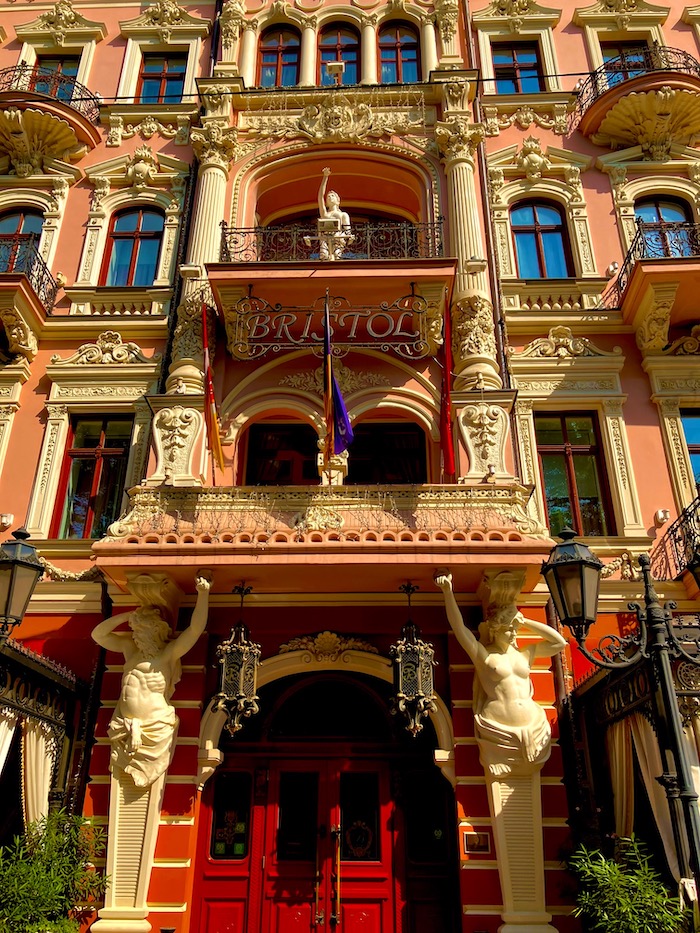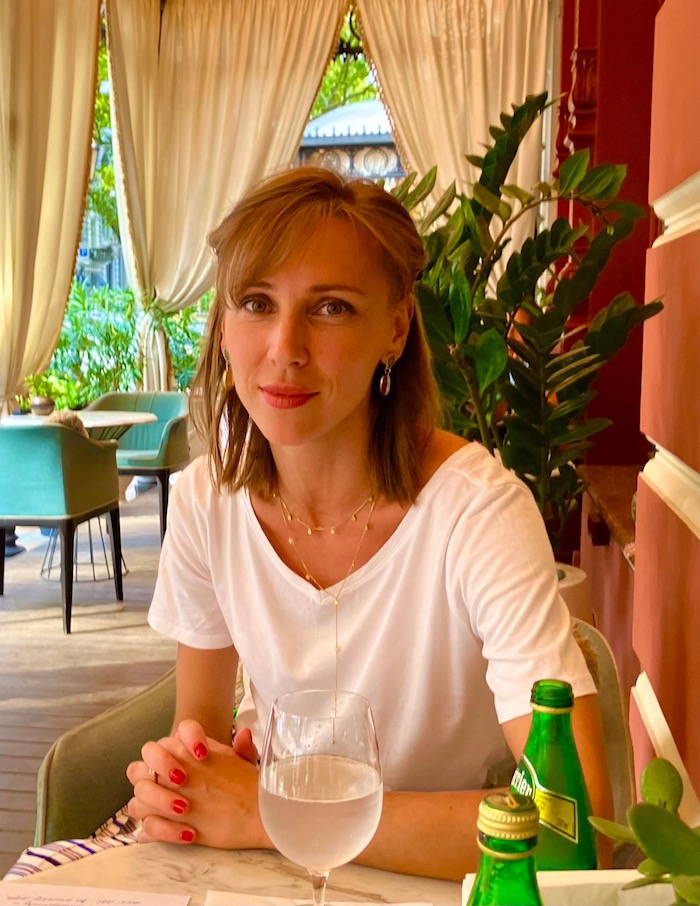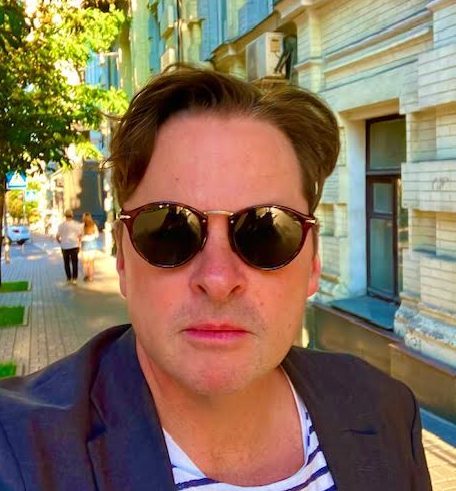- Ravi Zupa
- Douglas Mason1
- Natalya Sukhonos
- Yael Friedman
- Jack Neary
- K. McLeod
- Bob Bickford
- Chris Vaughan
- Chris Robinson
- Lynn Crosbie
- Rosby Strong
- Alana Solomon
- Velvet Chic Volcano
- Douglas Mason
- Suzanne Richardson
- Steve McOrmond
- Charles Wing-Uexküll
- Corey Hardeman
- Eliška Jahelková
- Todd Dixon
- Donnez Cardoza
- Rebecca Blissett
- Lunar Boy from Salem and Cinemascope
- Douglas Mason2
- Gun Roze
- Jane Wilson
- Toby Rosenbloom
- James Sutherland-Smith
- Kathryn McLeod
- Michael Murray
- Josh Patterson
- Anonymous
From Tolstoy to tears–life in war time Odessa
The terrace of the Bristol Hotel, a Baroque Revival masterpiece on Odessa’s famed Pushkinska Street, is a fitting place to be discussing Russian culture and empire and its contemporary importance. Odessa and the Bristol were the haunt of Russian writers and the city, with its relaxed Mediterranean character, has always been a place of respite or exile. That is particularly so now during Russia’s war with Ukraine, a setting that could be the back-drop for one of the great Russian novels. We met at the Bristol to speak with Katherine Ergeeva, a researcher at Odessa’s Literary Museum and who is a Russian speaker in a city where Russian is most peoples’ first language.

I have lived my whole life in Odessa and Russian is my first language, the language of my studies and my personal and professional life. I studied Russian literature and it embodies certain ideas. They are complicated ideas. In Russian literature high ideals are motivating forces but they cannot be realised due to more powerful forces. The context is hard and the characters are not pragmatic. And so the experience instead is disappointment and tragedy. It does not end well. In Russia there is always tragedy—for the individual and for the country. And now we are in a war based on Russia’s ideas of imperial destiny from the 19th century.
In the opening days of the war I was more shocked than frightened. On the first day I woke to the sound of bombs. And then we lived with the sound of air raid sirens every day, many times a day. I slept in a hallway in my apartment due to the two wall rule—that you must have at least two walls between you and the outside of the building from where the force of a bomb blast would come. My grandmother lived through WWII and had told me that war was the worst thing that can happen. I did not understand that then, but I do now. You cannot understand something if you do not live it.
The city was full of road blocks and soldiers. Our country was being invaded and it looked like it might even be conquered. It is strange to imagine that your own city, your own neighbourhood, might being occupied by enemy soldiers. The Russians came as far as Mykolaiv, which is two hours away from Odessa. We looked to our army to stop them there, and they did. What I remember is that everyone did something to help—food, medicine, donations of money directly to the armed forces bank account, and often coming from people who are quite poor and not able to afford that.
Now there is war and I am conflicted—it is difficult to separate the Russian cultural heritage from what is happening. The people who have invaded my country do not seem to have any connection with this culture. How can I associate the beauty of Rachmaninoff and Pushkin with the death and destruction we have now?
Has Russia always been an aggressive country? I suppose so. It has always been a country of empire, with imperial ambitions. An imperial country must acquire and dominate territory. If they do not, they will end—it is who they are. To change that, is to change the human mind. I knew that existed as an idea; but it belonged to Russia’s past. I did not expect to see war and imperial conquest being acted out in my lifetime. I guess it is two sides of the same face.
In the books of Pushkin and Tolstoy war is always a back drop—many of the beautiful short stories take place in provincial towns where military officers are traveling through on their way to war or to put down a rebellion. It is like Russia invading Ukraine now—they view us as a rebellious province that must be brought to heel.
As a country Russia is going down a self-destructive path and I do not know how it can be brought back from that. The rhetoric there is angry and extreme, very nationalistic. Yes, they are not being told the truth, and there is terrible propaganda in their media. But people seem to be responding to messages based on empire, it is like genetic memory. One friend—he is an intelligent man, a university professor—told me: “whatever Russia decides to do is right because it is Russia!” I have friends in Moscow and St Petersburg who are horrified by what is happening, but to speak out is too dangerous. I have not lost my friendships but other people have—it has divided people, divided families.
Russia believes that it is special, that it inhabits a unique world, a continuity of eastern Christian civilisation as the third Rome after Constantinople. And from that comes a special mission to carry this culture to the smaller countries on its borders. That is an imperial mission.
But empires have a beginning, middle and end. The epoque of empire ended over 100 years ago after the first world war. Other countries have found post-imperial roles for themselves, like Britain or Turkey. They have to live within their present borders. Russia is fighting that. It is failing to reconcile the high ideals of its culture with the reality of the world around it. If there is a problem you can change yourself, or you can try to change the world! The Russian soul is full of contradictions.
How do we return to Russian culture now? I do not know. Our Ukrainian theatres do not even want to perform Russian ballet. Does it require a period of pause and reflection to reassess Russian culture, I think so. We need time to do that. First we need victory in the war to have our territory back. We then need peace and time… time to calm ourselves. The time to reaccept and revaluate Russian culture must come later. But it must be in a different way, not in a way that involves being part of an empire. Literature helps us develop empathy and understanding of what is beyond ourselves. Russian culture must do that, but as part of a world heritage.
Russian is my native language. I speak Ukrainian fluently, but in everyday life I speak Russian. That is true for most people in Odessa and other areas of the south and east of Ukraine. People feel robbed of their culture when their own language represents invasion and conquest. Language is identity. Part of yourself is lost when that is in question.
We were a bilingual country; people spoke both Ukrainian and Russian. Now we are seeing a shift. Those who are Russian speakers speak Ukrainian in public. Some who did not speak it well are taking lessons. Many of our politicians have done so, even our President Zelensky; he is a native Russian speaker. His grasp of Ukrainian is definitely much better now.
But there are also people who struggle, including those who are older and do not speak it well. Do they experience discrimination? I suppose so. We have situations where people displaced by war who have gone to the west of Ukraine to find safety, are told: it is because of you that we have this war! The Russians came here to liberate you! It is not fair, of course, but that is what is said. These people defend themselves and say that Russian is not a language belonging only to Russia, it is also a cultural language for the Russian speaking Ukrainians. For English speakers the English language does not belong only to the English, it is a shared language.
Since the war started the atmosphere in the country has been very united, everyone helping in some way, not just as soldiers or local defence. That seems to be a gift of Russia in this war to have united us. It was not united before. Different parts of the country were different from each other. Russia wanted to divide Ukraine and they have achieved the opposite.
We felt this unity most especially during the early months of the war. People had strong feelings about liberation and independence. It was not abstract or text book, but actually lived and understood. It is something you cannot easily describe when you have not lived through war and felt your country under threat of being occupied.
Things have been changing. We have always had a radical element, people who have hard views about identity and country. This sentiment, you could call it a nationalist right wing sentiment, has become stronger. You see it in social media and the arguments that take place there. This faction was always there, and they are also some of the first people to have joined the military to defend us, even before the war. But there are lots of volunteers on the front lines who are Russian speaking Ukrainians who are also fighting hard, but do not go along with this sentiment. And so there is argument and there is discord.
Nationalism means something here it does not in the West, or not exactly. We have had to fight for so long to be a country and these people were often the ones doing the most for that, so there is some different context. But it is leading to problems. This is growing and I am afraid that it is going to become harder to stay as united as we are now. Some of our politicians, including in the president’s office, have promoted a tolerant narrative, but this co-exists with the very hard public narratives that are part of being at war—it is not easy to reconcile tolerance and victory against an enemy in battle at the same time.
The task ahead for Ukraine is a difficult one. We have to realise ourselves as a nation in a different way. It should be an open way, and not a dead end. To understand yourself as a nation, you have to understand all of it. During so much of our history we were under the rule of powerful empires and this leaves a complicated legacy from which to build a common discourse.

Katherine Ergeeva
What is the future for Ukraine—I think it is a western future, at least a civilisational future based on values and the rule of law. We are very focused on membership of the European Union. That is the kind of open society and government we need, based on democracy. The country is united around the idea of throwing off the culture of empire and authoritarianism. We had to start from the beginning in building a new way of thinking; before it was a Soviet way of thinking. We have moved a long way from that since we left the USSR in 1991. It has not been perfect, but it has happened.
For Ukrainians to reconnect with Russian culture in a neutral way is going to take time. But for now the movement is in the opposite direction—Russian culture is being erased. Statues are being removed, Russian literature has been taken off the school curriculum, only Gogol and Bulgakov remain because they were Russian writers with Ukrainian roots.
In Odessa that is especially painful. It has a long history as a Russian city; it was founded by Catherine the Great and the connections to Russian culture are actually stronger than to Ukraine’s. That may be inconvenient to note now, and we know why this happened, but it is true. If we throw out this culture what does Odessa become, a holiday place for the rest of the country, a party town? Odessa has unique history and character—associated with literature and culture, travel and trade and exile; different peoples have always found a home here and much of the richness of the city comes from that.
What would Alexander Pushkin say if he were here? He is closely associated with Russia’s culture. He was a man of empire, certainly. But he was also a man of liberty and freedom who was sent into exile in Odessa as punishment for criticism of the Czar. We know that he sided with peoples who were fighting for freedom. So we have to assume that he would understand us in the current circumstances. If there is a way back for Russian culture in Ukraine perhaps it is through Pushkin.

Douglas Mason
Douglas Mason is a Canadian writer and economist who has spent time at the sharp end of things in various countries and now lives in a village in rural South Africa. He believes that liberal democracy, the rule of law, free markets and open societies are things to be cherished. He is on extended assignment in Ukraine.
